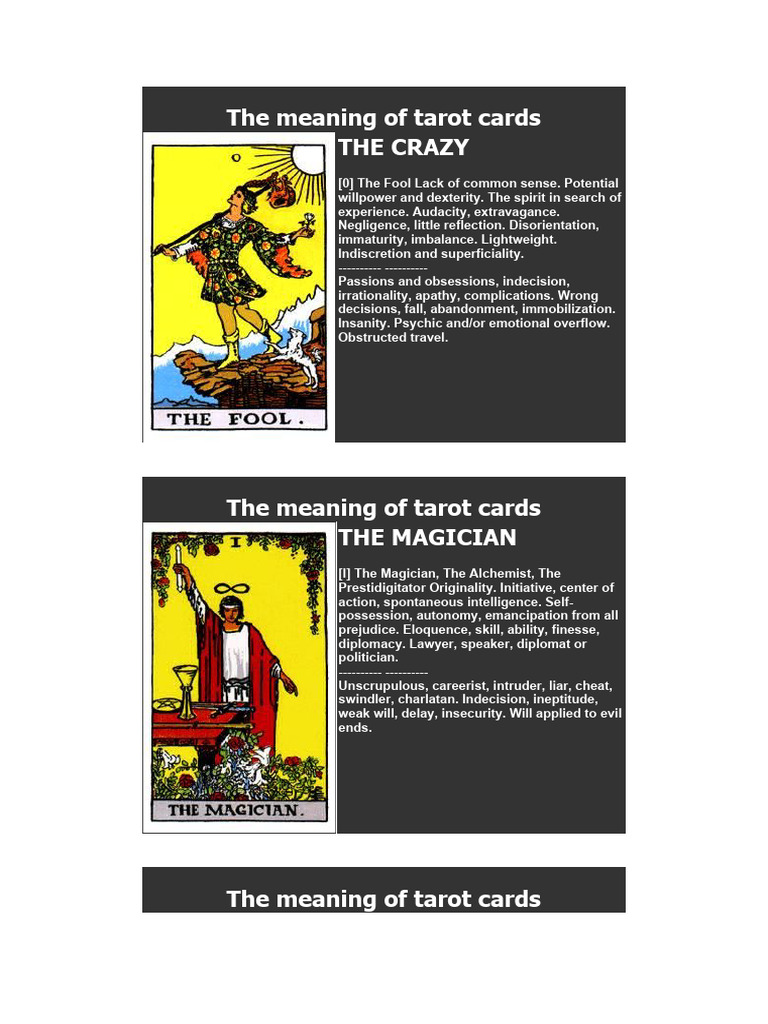The enigmatic allure of tarot cards has captured the imaginations of many, offering a unique blend of art, spirituality, and introspection. However, within the context of Christianity, the reception of tarot cards is often laced with skepticism and concern. To grasp the essence of tarot from a Christian perspective requires delving into various facets: the historical backdrop, theological reflections, and emotional responses they evoke.
Historically speaking, tarot cards emerged in the 15th century as playing cards, primarily used for games among European nobility. However, by the 18th century, they had transcended their recreational origins, evolving into tools of divination. This metamorphosis laid the groundwork for a complex relationship between tarot and faith. For many Christians, the act of seeking guidance through tarot evokes a profound sense of conflict, as divination practices often stand in stark contrast to biblical teachings.
From a biblical standpoint, Christian doctrine emphasizes reliance on God’s word as the ultimate source of wisdom and understanding. Proverbs 3:5-6 urges believers to trust in the Lord rather than lean on their own understanding. When tarot cards are used as a means of predicting the future or revealing hidden truths, they are perceived as an affront to this principle, suggesting a reliance on human artifact rather than divine providence. This fundamental divergence creates a chasm between the tarot’s intended use as a self-reflective tool and the Christian commitment to faith-centered discernment.
Consider the metaphor of a compass lost in the wilderness. For those who turn to tarot, it may seem like a way to navigate the obscurities of life’s journey. The cards act as focal points, offering a semblance of clarity in tumultuous times. Yet, for Christians, this compass could lead one astray from the true North found in Scripture. The appeal of tarot lies in its ability to prompt introspection and provoke profound emotional responses; however, it places the seeker in the precarious position of relying on symbols and archetypes rather than the gospel’s promise of divine guidance.
An intriguing aspect of tarot is its rich symbolism, which draws from a multitude of traditions, myths, and archetypes. Each card tells a story, laden with varied meanings that resonate differently with individuals. The Fool, representing new beginnings and leaps of faith, may enchant a seeker with its allure of adventure. Conversely, the Christian perspective might view this card with caution, interpreting its message through the prism of Christ’s teachings on stewardship and the weightiness of choices made in life. Such nuanced interpretations signify the broader claims associated with tarot: they can reflect an individual’s inner psyche even as they drift from established Christian teachings.
The tension between seeking answers through tarot and adhering to Christian doctrine can evoke intense emotional reactions. For some, the cards offer a sense of control amid uncertainty. As life unfolds, marked by career shifts, relationship dilemmas, and existential questioning, the urge to find answers outside of traditional religious practices can feel overwhelming. This pursuit of understanding encapsulates a deeply human desire to connect the dots of existence, yet, it also raises uncomfortable questions about our faith’s resilience in times of crisis.
On the flip side, a more contemplative Christian might engage with tarot as a catalyst for deeper reflection. Rather than viewing the cards merely as tools for divination, they can be approached as visual metaphors for the struggles and triumphs experienced on one’s spiritual path. The imagery of cards can illuminate intrinsic truths about oneself, fostering a dialogue that stretches beyond the superficial layer of their symbolic meaning. In this light, tarot could serve as a mirror, reflecting inner turmoil and desires while remaining anchored in the conviction that ultimate guidance lies within God’s unwavering love.
Furthermore, the conversation about tarot extends into the realm of cultural engagement. The rise in popularity of tarot among diverse groups often points to a broader societal quest for spirituality unshackled from institutional constraints. While some Christians might feel threatened by this, it also opens avenues for dialogue. Engaging thoughtfully and respectfully with individuals who find solace in tarot can bridge the gap between differing belief systems. By approaching the subject with curiosity rather than condemnation, Christians can explore the underlying human yearning for connection, meaning, and understanding.
Ultimately, the implications of tarot within a Christian framework are multi-layered. The juxtaposition of self-exploration through tarot with the pursuit of faith and obedience to God presents a dichotomy that is both complex and fascinating. While the cards may serve as catalysts for personal insight, they also challenge believers to reaffirm their trust in divine wisdom as revealed in their spiritual texts. It is crucial to maintain an open yet discerning heart, recognizing that many traverse their spiritual journeys via diverse paths.
In conclusion, the confluence of tarot and Christianity invites individuals to engage in thoughtful reflection on their beliefs and practices. Whether viewed as tools of deception or instruments of self-discovery, tarot cards hold a mirror to the dilemmas faced by contemporary spirituality. Ultimately, navigating this intricate landscape necessitates a commitment to dialogue, understanding, and a deepened reliance on the grace that marks the Christian faith.







Leave a Comment